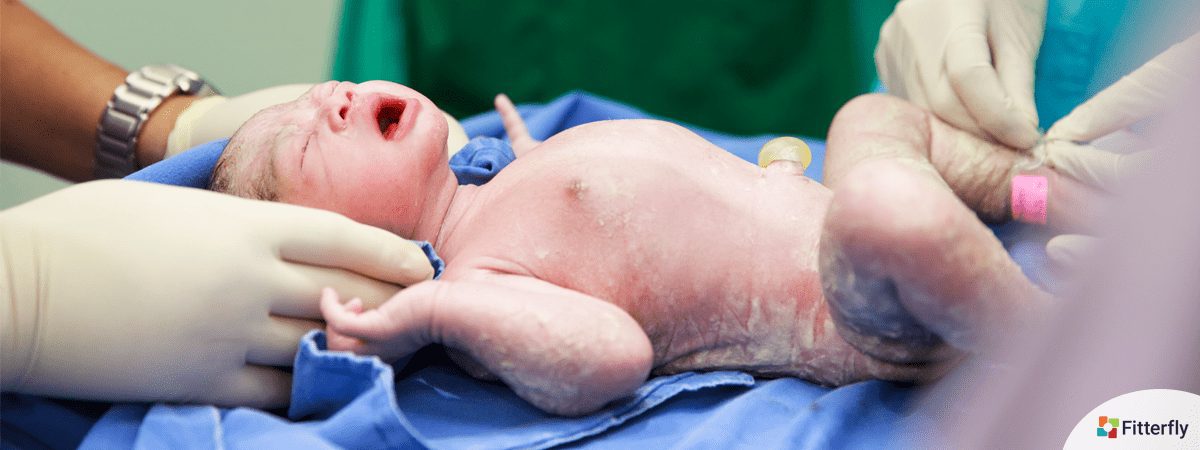What Pregnant Women Should Know About the Complications of GDM (Gestational Diabetes)

Every pregnant woman wants her pregnancy to be perfect. But, for a few women, it doesn’t come that easy. Among all the challenges, Gestational Diabetes Mellitus (GDM) is the most common problem a woman faces during her pregnancy.
If left untreated, the complications of GDM can be many, and it can affect both mother and her baby. So it is natural for the mother to get worried about how complications of GDM can affect her developing baby.
Undoubtedly, the complications of GDM can be the cause of the anxiety, but there’s good news — careful management can reduce the complications of GDM for the mother and the baby. Expert-led personalised coaching can prevent complications of GDM and help a mother have a healthy pregnancy, delivery and a healthy baby.
Effects of Diabetes on Pregnancy – How does GDM affect the baby?
Here are the 10 possible complications of GDM for the baby:
1. Larger baby (Fetal Macrosomia)
Due to raised blood sugar levels, the baby gets more glucose from mother’s blood. This extra sugar that the baby gets from mother’s blood is stored as fat, making them grow larger than usual. Babies weighing more than 4kg at birth are called macrosomic babies.
2. Birth Injury
Due to the baby’s large size, injuries can happen at the time of birth. There is a high chance of the baby’s shoulders getting stuck during delivery which can cause shoulder injury (shoulder dystocia).
3. Hypoglycemia
The baby may have extremely low blood sugar levels immediately after delivery. Hypoglycemia (low blood sugar) is more commonly seen in those babies born to mothers who have had high blood sugars for a long time. To correct this, the doctor will give IV glucose to the baby after checking their blood glucose levels soon after birth.
4. Breathing difficulties
Excess of glucose or insulin inside the baby’s body interferes with the growth of the lungs. As a result, it can cause respiratory distress, especially in babies born before the 37th week of pregnancy.
5. Jaundice –
Yellowish discolouration of the skin and eyes is seen in some newborn babies. It is caused due to rise in a pigment called bilirubin. Bilirubin is produced when red blood cells break down. Babies born with jaundice are weak and have troubling feeding but it is a treatable condition. Babies born with jaundice are kept under a special light that helps to get rid of the bilirubin pigment.
6. Birth defects
Birth defects are more likely in babies of mothers diagnosed with GDM. Major birth defects are seen in the heart and blood vessels, brain and spine, kidneys, and digestive system.
7. Preterm birth
Raised blood sugar levels dramatically increase the risk of going into premature labour and giving birth to a premature baby.
8. Obesity and type 2 diabetes in the years to come
Later in life, the baby is at a higher risk of becoming obese and getting diabetes. But, a mother can lower the odds for these problems by helping her child live a healthy lifestyle from the beginning. Here are a few tips on making healthy food choices for the child to prevent childhood obesity.
9. Stillbirth
If left untreated, GDM can even cause loss of the baby in the womb or at the time of delivery. The exact reason for stillbirth in patients with GDM is not known. It could be due to the slow growth of the baby in the uterus due to poor blood circulation or other conditions, such as high blood pressure or damaged small blood vessels.
10. Growth restriction of the baby
Due to the problems with the placenta (placental insufficiency), the transfer of oxygen and nutrients may not occur effectively from the mother to the baby. Placental issues are more severe in mothers who get GDM in the early months of their pregnancy and whose blood sugars are not controlled. Placental insufficiency leads to intrauterine growth restriction (IUGR).
Effects of Diabetes on Pregnancy – how does GDM affect the mother?
Here are 5 complications of GDM for the mother :
- Premature delivery – Research has shown that women with GDM have higher chances of going into premature labour naturally. So the mother might deliver a preemie.
- Higher chances of getting gestational diabetes in subsequent pregnancies
- Gestational diabetes increases the risk of developing other complications such as high blood pressure and preeclampsia.
- Increased risk for type 2 diabetes and heart problems later in life.
- Increased chances of having a surgical delivery (C-section) because of a bigger size (macrosomic baby).
What are the risk factors for gestational diabetes?
GDM can develop in any woman at any trimester of pregnancy. However, the risk factors for gestational diabetes include:
- If a woman is obese or overweight with a BMI of more than 25, she is at high risk of developing GDM.
- Women with an inactive lifestyle
- Previous history of diabetes or prediabetes
- Polycystic ovary syndrome (PCOS)
- Diagnosed with GDM in the previous pregnancies
- Positive family history of diabetes
- Previous baby with birth weight more than 4kg
- Women with South Asian ethnicity have a higher risk of developing GDM.
- Women who are expecting multiple babies.
- Women who have gained a larger than average amount of weight during pregnancy.
- Ideally, a pregnant woman should gain 1 to 2 kilos in the first trimester and 1 kilo per two weeks for the remaining months. Click here to know more about how much weight a mother should gain during pregnancy.
- Pregnant women above 25 years of age.
- Positive history of miscarriage or stillbirth.
- Have been on glucocorticoids.
Prevent complications of GDM with the help of Diabefly GDM
A pregnant woman can prevent the daunting complications of GDM by doing a few lifestyle modifications. She doesn’t have to live under the constant fear of how the raised blood sugar will affect her pregnancy and her baby’s growth. Medical Research has also proved that 90% of women with GDM can be managed entirely with lifestyle therapy alone without any need for medications.
And, this is where the role of Diabefly GDM comes in. Diabefly GDM – A safe & scientific Diabetes Care Program for pregnant women with diabetes. It comprises three specialist coaches – a Pregnancy Nutritionist & Diabetes Educator, a Certified Physiotherapist and a Clinical Psychologist to help a pregnant woman balance her blood sugars during the most cherished phase of her life.
Leave worries, make memories with Diabefly GDM. We handhold her when she needs it most.
For more information on managing high-risk pregnancies, visit our website at www.fitterfly.com/diabefly-gdm or call us at 022 4897 1077.
This blog provides general information for educational and informational purposes only and shouldn't be seen as professional advice.












